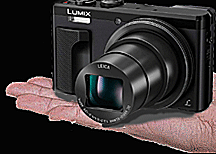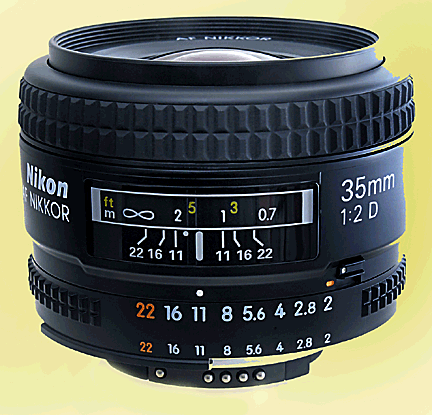Try it on for size
 Digital cameras are more computer oriented than photographic,
so if possible visit a large computer store where you'll find them displayed in a
hands-on fashion, without the pestering glances of overzealous photo
salespeople. Pick up the camera and hold it. Get comfortable with it in
your hands. You'll be able to immediately tell whether the camera
"feels right." If it feels awkward or hard to hold, then put it
down and consider one that feels comfortable, regardless of its
specifications. Trying the cameras on for size doesn't mean you have to
buy there, however. You may already deal with a camera store or want to
buy online. Now you'll know exactly which cameras feel comfortable--ones
you'll be able to hold steady for perfect photos.
Digital cameras are more computer oriented than photographic,
so if possible visit a large computer store where you'll find them displayed in a
hands-on fashion, without the pestering glances of overzealous photo
salespeople. Pick up the camera and hold it. Get comfortable with it in
your hands. You'll be able to immediately tell whether the camera
"feels right." If it feels awkward or hard to hold, then put it
down and consider one that feels comfortable, regardless of its
specifications. Trying the cameras on for size doesn't mean you have to
buy there, however. You may already deal with a camera store or want to
buy online. Now you'll know exactly which cameras feel comfortable--ones
you'll be able to hold steady for perfect photos.
What are you going to use it for?
Don't purchase a digital camera on a whim--or
because it's on sale. It's not a toy although you'll definitely have fun
using it once you learn how. Decide what you're going to use your digital
camera for before plunking down your hard-earned dollars for one.
LCD size
Digital camera manufacturers are making digital cameras
smaller and smaller--because they can. Try to pick one that has an LCD
viewing screen of at least 1.6 inches--3.0 is preferable, especially if
you're an older person whose sight isn't what it used to be.
 Storage
Storage
There are several forms of digital storage media cards to choose from.
If this is your first camera, read the article on digital storage media
and choose a camera that uses one that's readily available and will
allow you to purchase additional cards at a reasonable price.
Additional lenses
For regular use, the zoom on most digital cameras will
do nicely. But if you're really into photography, you may want to buy an
advanced DSLR
camera that can take additional lenses.
Type of batteries
 Most
digital cameras come equipped with a variety of
batteries. If
you travel a lot and want to take your camera along, you shouldn't buy a
camera that uses any sort of battery that needs to be plugged in to
recharge. Voltage varies in other countries and plugging in your camera
could ruin it. A few digital cameras
still use two or four AA
batteries. While it's advisable to use AA power cells instead of regular
batteries, you'll find that these can last quite a long time if you don't
use your LCD to view your subject when taking your photos since it can
drain battery life quickly.
Most
digital cameras come equipped with a variety of
batteries. If
you travel a lot and want to take your camera along, you shouldn't buy a
camera that uses any sort of battery that needs to be plugged in to
recharge. Voltage varies in other countries and plugging in your camera
could ruin it. A few digital cameras
still use two or four AA
batteries. While it's advisable to use AA power cells instead of regular
batteries, you'll find that these can last quite a long time if you don't
use your LCD to view your subject when taking your photos since it can
drain battery life quickly.
Manual vs. Automatic
 Whether you purchase a digital camera that's fully
automatic or has manually capabilities depends on what you'll be using it
for. For typical family photos, an automatic camera will work nicely at
much less cost. Today, many people use their smartphone
camera exclusively.
Whether you purchase a digital camera that's fully
automatic or has manually capabilities depends on what you'll be using it
for. For typical family photos, an automatic camera will work nicely at
much less cost. Today, many people use their smartphone
camera exclusively.
Fitting your budget
Digital cameras come in all price ranges. Pick one that
suits your needs and your budget.
To read detailed reviews of digital cameras, visit
Steves
Digicams.

